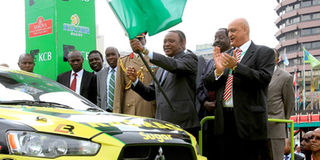Efforts to get the Safari Rally back on WRC calendar laudable

President Uhuru Kenyatta flags off Baldev Chager, driving a Mitsubishi lancer Evo10, with Kenya Motor Sports Federation Chairman J. S. Vohra (right) at the start of the Safari Rally at KICC on September 12, 2014. PHOTO | ANWAR SIDI |
What you need to know:
- What’s reassuring is the fact that the Safari’s WRC bid enjoys the support of other African nations, including South Africa who withdrew their quest to be on the global circuit in favour of Kenya.
- FIA’s Sh11 million technical and safety support for the Safari is another good sign, and we hope that organisers of next month’s Safari Rally will do a flawless job to further trumpet Kenya’s WRC bid.
- All the best to “PM” Kimathi and team. The work has just started.
International Automobile Federation (FIA) President Jean Todt is in Nairobi where he is expected to open the World Rally Championships Safari Rally Project offices at Kasarani on Tuesday.
The visit by the FIA supremo is a significant step towards Kenya’s bid to have the Safari Rally back onto the World Rally Championships (WRC) calendar.
For many years, the Kenya Motor Sport Federation (KMSF) has toyed around with the idea of pushing for the Safari’s return to the prestigious WRC calendar, but such efforts haven’t been as spirited and pronounced as they are under current KMSF President Phineas Muriithi Kimathi.
Under “PM” Kimathi, the KMSF has succeeded in securing government support and funding for the WRC Safari Rally Project with Treasury releasing about Sh200 million to launch Kenya’s campaign to return to the circuit.
The offices that Todt officially opens Tuesday are the part of the government’s rich contribution after last November’s gazettement of the WRC Safari Rally Project team driven by former rally ace Kimathi as chief executive officer.
The Safari Rally was easily the world’s toughest rally in its hey day, a fact that Todt knows only too well as he competed as a navigator in the 1970s Safari when he was a most sought after navigator, sitting with top drivers such as Jean-Pierre Nicolas, Ove Andersson, Rauno Aaltonen and Hannu Mikkola.
Images of Todt (who is also the United Nations secretary General’s special envoy on road safety) clicking into and out of muddy Safari control points in a Peugeot 504 Coupe are still vivid as the FIA boss rekindles his romance with Kenya through his current visit.
It’s of great concern that there is no African rally in the 13-round WRC circuit, a factor that boosts the Safari’s bid to be back on the roster.
But KMSF and the government shouldn’t take anything for granted, as the endorsement of the Safari will not come on a silver platter, or as an affirmative action.
A lot of ground has to be covered, which Kimathi and his team at the “WRC Safari Project” are well aware of.
The Kenyan rally was struck off the world calendar in 2003 due to safety and financing issues, and the “WRC Safari Project” must move to design an event that will secure safety while at the same time enticing the fans back to the competition that was once synonymous with the Easter holidays.
Todt lives and breathes motorsport (he is a former boss at Ferrari and Peugeot, and his 41-year-old son Nicolas manages Formula One star Felippe Massa and owns a racing team) and his assessment of Kenya’s bid will not simply be based on nostalgia.
For several years, motorsport in Kenya has been the recluse of a few and competitions have been run on private farms, excluding the ordinary mwananchi from the adrenalin-filled action.
Kimathi’s team must design ways of bringing the sport back to the people while at the same time ensuring that safety aspects aren’t compromised.
After Todt’s visit, Oliver Ciesla, the chief executive of the WRC Promoter GmbH (The company that owns WRC commercial rights), will also visit Nairobi to assess the commercial viability of the Safari as a WRC round.
Kimathi has done well to network within the FIA and WRC top echelons and Todt’s visit is a culmination of these exchanges, which also included Todt’s courtesy call on President Uhuru Kenyatta in 2015 where the FIA boss received assurance of the government’s support for the Safari.
The gains of a WRC Safari are numerous, including injection of foreign exchange into the Kenyan economy and the marketing of the country to a global television audience of approximately 800 million people.
For instance, in the 2002 edition, the Safari accumulated over Sh30 billion worth of global airtime with about $6 million (Sh600 million at current exchange rates) injected directly into the Kenyan economy, largely through hotel and logistics-related expenses by the competing teams.
What’s reassuring is the fact that the Safari’s WRC bid enjoys the support of other African nations, including South Africa who withdrew their quest to be on the global circuit in favour of Kenya.
FIA’s Sh11 million technical and safety support for the Safari is another good sign, and we hope that organisers of next month’s Safari Rally will do a flawless job to further trumpet Kenya’s WRC bid.
All the best to “PM” Kimathi and team. The work has just started.
Karibu Kenya monsieur Jean Todt!
Please help get us back onto the WRC circuit.





